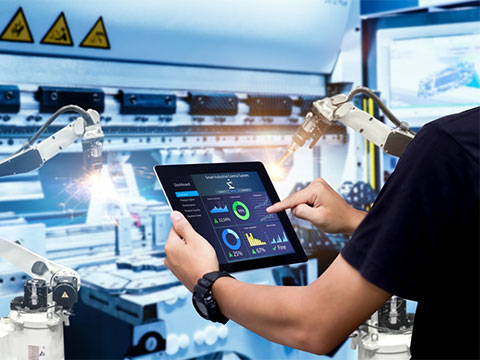
Posted to News on 15th Dec 2023, 12:30
Entering 2024 with an air of optimism
With news that food manufacturing giant Mars is augmenting operations across its 160 manufacturing plants with Microsoft's Azure Digital Twins IoT service, Stephen Hayes, managing director of Beckhoff UK, explores this and some of the other trends that he foresees in 2024.

(See Beckhoff at FoodManufacturing.Live, 1 May 2024, on stand 53)
The past year and a half posed significant challenges for every aspect of the supply chain, and it was not uncommon to encounter lead times of more than 52 weeks for components like drives, PLCs, HMIs and other advanced products. However, there is now a noticeable improvement in the lead times and inventory levels across the supply chain are on the rise.
Gone are the weekslong backlogs of cargo ships at large ports, and even ocean shipping rates have plunged below pre-pandemic levels. Simply put, goods are moving around the world again and reaching companies and consumers.
The manufacturing sector is now moving in a positive direction, despite it having taken a huge hit during the pandemic. In fact, according to Statista, an annual growth rate of 3.57 per cent is expected between now and 2028.
As the sector continues to recover, manufacturers are looking for strategies to be more resilient and protect their companies against global economic factors in 2024 and beyond. With that said, let's look at the upcoming trends that I expect to see in the upcoming year.
Reshoring manufacturing
Following the recent concerns about intellectual property theft, geopolitical tensions and environmental impact, we will see manufacturers reshoring to North America and Europe.
For example, when manufacturing is done domestically, the costs and time associated with transporting goods internationally are significantly reduced. Car manufacturers, like Tesla, already benefit from reshoring by producing cars closer to their main market, reducing logistics costs and time.
As companies look to become more resilient and less vulnerable to global crises that impact their supply chain, I would expect this trend to continue in 2024.
Artificial intelligence
According to Rootstock's State of AI in Manufacturing survey, which spoke to 350 manufacturers in the US, UK and Canada, 82 per cent of manufacturers plan to increase their budgets for artificial intelligence (AI) in the next 12 to 18 months. Plus, 24 per cent are also planning increases from 26 per cent to 50 per cent.
There has been a notable increase in interest and adoption of AI since the introduction of ChatGPT, especially in the manufacturing sector. Just look at the uptake of digital twins across the past few years, which has provided plant managers with the ability to accurately view their entire floor in a simulated environment.
With the addition of AI, digital twins have the potential to enhance accuracy and realism by using computer vision, machine learning and deep learning. AI can also help digital twins learn from their own experiences and adapt to changing conditions, with insights and recommendations provided based on the data and outcomes of the simulations.
Predictive maintenance
Digital twin technology extends its impact beyond optimising manufacturing and product design. In fact, it plays a significant role in predictive maintenance and managing asset performance.
For example, confectionary, pet care and food company, Mars, is augmenting operations across its 160 manufacturing plants with Microsoft's Azure Digital Twins IoT service. The company is improving capacity and process controls by creating software simulations, thereby increasing the uptime of machines through predictive maintenance and reducing waste from machines packaging inconsistent product quantities.
Such software options, which also include Beckhoff's TwinCAT, serve as a robust platform for crafting, modelling and implementing digital twin models. By integrating sensor and IoT data into digital twins, manufacturers can gain insights into physical asset health and performance.
As we come to the end of this year, these are the trends that I see continuing in 2024. From reshoring to the increasing adoption of digital twin technology, manufacturers will be hoping for a less disruptive supply chain as we gradually return to some sort of normalcy.





